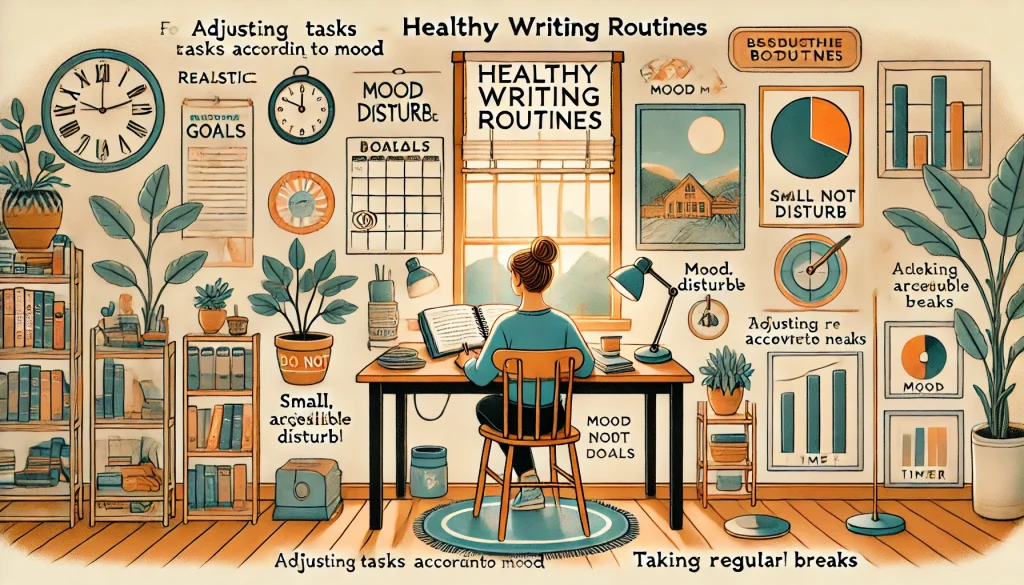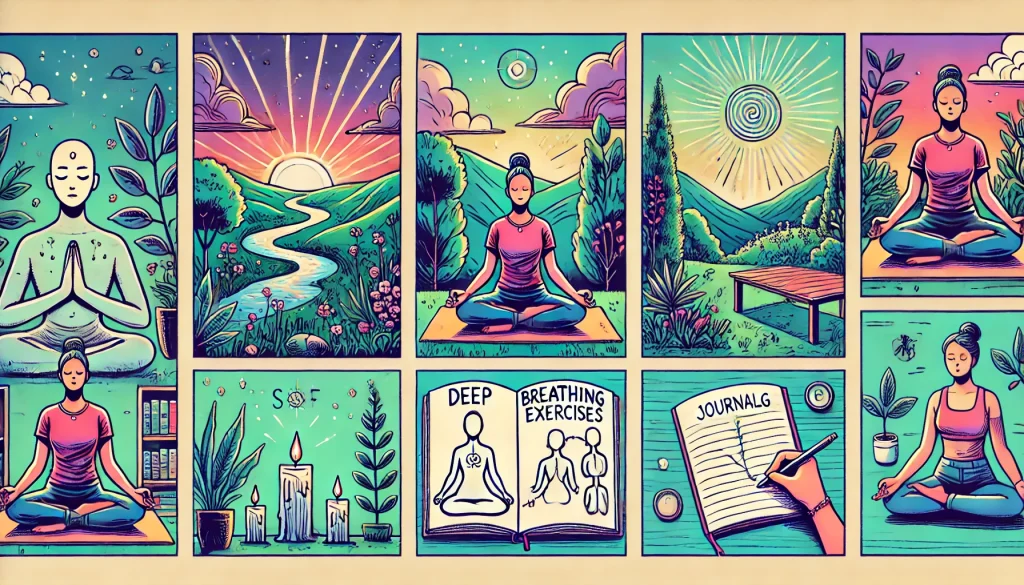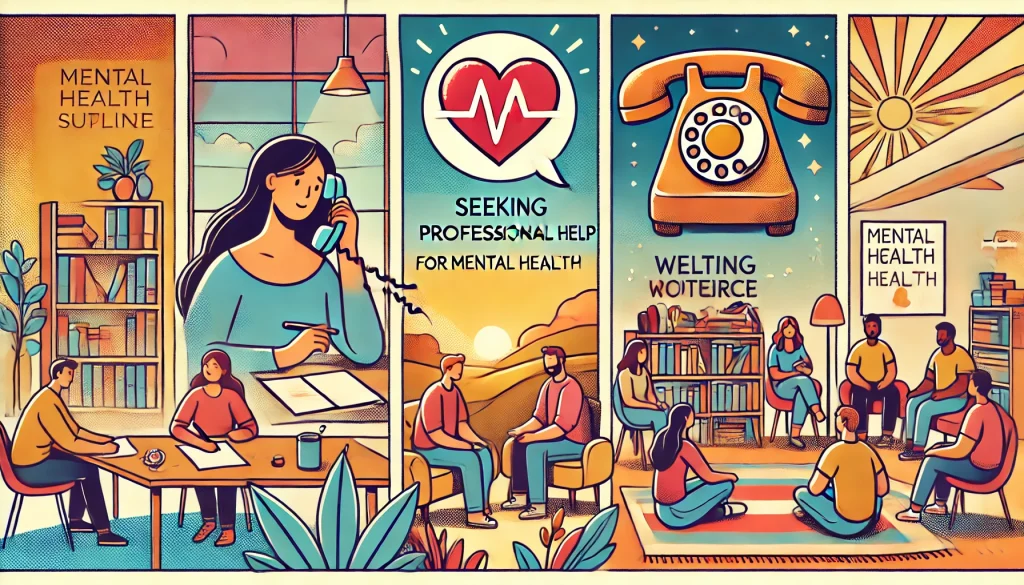Table of Contents
Explore Blogs
Trending on Ebook
How Writers Manage Their Mental Health

Writing is a solitary occupation that involves a writer sitting alone and writing intensely for a project. However, whenever you ask a writer how they feel about writing – they will express the joy of being able to spend all day writing and the satisfaction that comes after seeing a well-written piece.
However, what they do not talk about is the mental health challenges that come with it.
Writing is more than simply putting words on a page; it’s an emotional, mental, and often exhausting journey that weighs heavily on a writer’s mind and heart. While experienced novelists may feel a bit less pressure than new writers, both of them may go through hard times.
Authors frequently encounter self-doubt, questioning the value of their work and skills, which impacts their mental health a lot.
Let’s explore how writers manage mental health and maintain wellness amid the highs and lows of the creative process.
Key Takeaways
- Writing Stressors – Writers face unique challenges, from loneliness to perfectionism, which can impact their mental wellness. Recognizing these aspects can develop strategies to manage them effectively.
- Be a Part of Community – Connecting with other writers provides support, reduces isolation, and builds a valuable network for sharing experiences, advice, and encouragement, especially for ghostwriters working in anonymity.
- Healthy Routines to Reduce Stress – Setting realistic goals, taking regular breaks, and establishing boundaries are essential for a writer’s mental wellness. Structured routines can prevent burnout and help writers maintain balance.
- Physical Health Supports Mental Health – Exercise, a balanced diet, and adequate sleep all contribute to a writer’s mental resilience, helping to reduce stress and improve focus for creative work.
- Seeking Help If Needed – Therapy, mental health resources, and wellness retreats can provide writers with effective tools and strategies to handle stress, boost confidence, and enhance mental wellness.
Recognizing the Mental Health Challenges Writers Face
For many writers, dealing with stress while writing is as common as writer’s block. That pressure can mount, making it easy to feel overwhelmed. Here are some of the common mental health challenges writers face:

-
Isolation and Loneliness
As mentioned before, writing is often a solitary endeavor. Spending long hours alone can lead to feelings of isolation. For those who work in ghostwriting services, the anonymity can add an extra layer of loneliness, as the work goes unrecognized by the public.
-
Burnout and Creative Block
The constant pressure to create can lead to burnout. This is not limited to full-time authors; even part-time writers or those in ghostwriting services can experience creative block due to exhaustion and stress.
-
Imposter Syndrome
Many writers, no matter how experienced, feel like imposters. This is especially true for writers who may not receive public acknowledgment of their work.
-
Perfectionism and Self-Criticism
Writers tend to be their own worst critics. Stress while writing often stems from the idea that every word must be perfect. Creative writing and mental health become tangled when perfectionism takes over, leading to excessive self-criticism.
Building a Supportive Writing Community
When a writer has people who understand the struggles of balancing creativity and mental health, they are less likely to feel overwhelmed and alone. Become a part of these places when you are in this situation:

-
Accountability Partners
Having someone who knows the stress of writing can make a big difference. Accountability partners help keep writers motivated and on track, particularly during challenging projects, which can be worrisome due to tight deadlines and client expectations.
-
Writing Groups and Workshops
Many writers join local or online writing groups, where they can share their work and receive feedback in a supportive environment. Such groups offer not only constructive criticism but also camaraderie, easing the mental burden of writing alone.
-
Social Media Connections
Social media provides writers with the opportunity to connect, share experiences, and feel part of a larger network, even if their name isn’t attached to their work.
Creating Healthy Writing Routines
Establishing a routine can help writers to manage tension. Sticking to a schedule not only builds consistency but also allows a writer to make time for other aspects of mental wellness.

-
Setting Realistic Goals
A stressed writer often falls into the trap of setting overly ambitious goals. Instead, breaking down projects into smaller, achievable tasks helps reduce stress. This is especially beneficial for ghostbook writers juggling multiple projects.
-
Establishing Boundaries
Writers sometimes feel the need to push through exhaustion. Setting boundaries—like specific start and end times for work—helps prevent burnout and mental exhaustion.
-
Write According to Your Mood
Writing doesn’t always have to feel forced. Sometimes, the best way to handle stress is to lean into whatever mood you’re in. Feeling introspective? Write for reflective topics. Feeling lighthearted? Try scripting something playful. Working as per your mood can make the process easier.
-
Taking Breaks
Like other working people, writers need breaks to recharge. Short breaks during the day and longer breaks between projects can reduce stress and foster mental clarity. Sparing some time and freshening up can reinvigorate creativity and improve a writer’s mental wellness overall.
Practicing Self-Compassion and Positive Self-Talk
Writing is a road that is often full of insecurities. For writers who continually don’t trust their talent or going through issues like imposter syndrome, positive self-talk can be transformative. They should try these things:

-
Reframing Negative Thoughts
Many writers are familiar with the cycle of negative self-talk, especially if they are facing deadlines or feel uninspired. Reframing these thoughts by focusing on strengths and achievements can improve a writer’s mental wellness.
-
Celebrating Small Wins
It’s easy to dwell on what hasn’t been achieved, but celebrating small victories, such as finishing a paragraph or completing a chapter, can make writers mentally strong and boost their confidence.
-
Accepting Imperfection
The need for perfection can hinder a writer’s mental health. They should be ok with imperfection, as it can be liberating, allowing the creative process to flow more naturally and reducing the stress of writing.
The Connection Between Mental Health and Physical Health
Staying healthy physically has a direct impact on the mind and can help writers reduce the possibility of stress-related setbacks.

-
Exercise and Movement
Writers who engage in physical activity, such as walking or yoga, find that it helps relieve stress. Exercise boosts endorphins, the body’s natural mood lifters, making it easier to approach writing with a clear, positive mindset.
-
Balanced Diet and Hydration
Eating well and staying hydrated are essential for maintaining mental focus and energy. A stressed writer is more likely to experience burnout if they aren’t fueling their body properly.
-
Sleep
For anyone balancing creative writing and mental health, sleep is critical. Adequate rest replenishes energy levels, sharpens focus, and makes it easier to cope with the demands of writing.
Practicing Mindfulness and Relaxation Techniques
Mindfulness and relaxation techniques can make writers remain calm, focused, and resilient, even when the demands of their projects feel overwhelming. A few of the techniques are listed below:

-
Mindfulness Meditation
Practicing mindfulness helps writers stay in the present moment, reducing stress and calming anxieties. This can be especially useful for professional writers balancing various client demands.
-
Deep Breathing Exercises
Breathing exercises are simple but effective in managing stress. Taking a few minutes to focus on deep breathing can help a writer reset their mind during stressful times.
-
Journaling
Many writers find that journaling provides a safe outlet for thoughts and emotions, which can enhance mental clarity and reduce stress. For ghostwriters, it’s particularly beneficial; as they may not always express their own ideas, journaling offers an opportunity for personal creativity and self-expression.
Learning from Other Writers’ Experiences
The hardships of mental health a writer experiences are indescribable. Sharing their journey and taking notes from others’ journeys can be an inspiration and practical advice for everyone.

-
Stories from Successful Writers
Learning about other writers who have faced mental health challenges can be encouraging. Many famous authors have openly discussed their battles with stress and depression, reminding others that they aren’t alone.
-
Quotes and Inspirations
Inspirational quotes from experienced writers can offer motivation and insight for anyone feeling the weight of writer stress. Embracing these words of wisdom can reinforce the importance of prioritizing mental wellness.
Seeking Professional Help
For some writers, stress management requires more than self-care; it may involve seeking professional support. Don’t suffer in silence, and never be afraid of asking for help.
Always remember

What happens when people open their hearts? They get better. – Haruki Murakami
-
Therapy and Counseling
Professional therapy can provide a safe space for writers to explore and address their challenges. It can help a writer navigate stress while writing and build strategies for managing mental wellness in the long term. Here, the writers learn that ‘You don’t have to control your thoughts. You have to stop letting them control you.’
-
Mental Health Hotlines and Resources
For authors in immediate need, support hotlines and resources offer an accessible way to get help. Many mental health services also provide resources specifically for those in creative fields.
-
Wellness Workshops and Writing Retreats
Writing retreats focused on wellness can be a transformative experience. These events combine relaxation with creativity, offering writers a chance to recharge mentally and emotionally.
Conclusion
As a writer, there will be days when you feel inspired to stay up late, creating stories and building characters. However, there will also be days when you feel burned out and irritable, struggling to absorb even the simplest words while reading. In both scenarios, it’s essential to take care of your well-being. Even on good days, practice meditation, go for walks, and allow yourself to take breaks. On the bad days, when your thoughts feel like they’re spiraling, remember to prioritize your mental health.
Be kind to yourself, and don’t hesitate to ask for help. Asking for assistance is the first step toward healing.
FAQs
How do I know if my mental health needs a doctor or can be managed on my own?
If you’re experiencing persistent feelings of sadness, anxiety, or stress that interfere with daily activities or they are showing up as physical symptoms such as pain in the chest – it’s a sign you may need professional help. Also, if self-care strategies aren’t improving your mental health, a doctor can provide guidance and treatment.
What do I do when I have to write but anxiety gives me shivers and I can’t?
Start by taking a break to calm your nerves. Practice deep breathing or meditation to reduce anxiety. Break the task into small, manageable chunks and focus on just starting with one sentence or paragraph. Give yourself permission to write imperfectly.
I forget things while writing and get ideas later; how can I manage that?
Try jotting down quick notes or an outline before you start writing. Keep a notebook or digital document for capturing ideas as they come to you so you can easily refer back to them during your writing process.
What’s a good way to manage stress when I get negative feedback after joining a community?
Focus on the constructive aspects of feedback, separate your self-worth from the criticism, and use it as an opportunity to improve. Practice self-compassion and take breaks to recharge so you don’t get overwhelmed.
I need isolation while writing but can’t get it; what should I do?
Try creating a quiet, dedicated writing space where you can minimize distractions. Set boundaries with those around you, or use noise-canceling headphones. If complete isolation isn’t possible, try to schedule focused writing times when others are less likely to interrupt.
When should I visit a counselor?
If you’re feeling overwhelmed by stress, anxiety, or negative emotions that affect your writing or daily life, or if you’re struggling with persistent issues like self-doubt or burnout, it’s a good time to seek professional help from a counselor.




